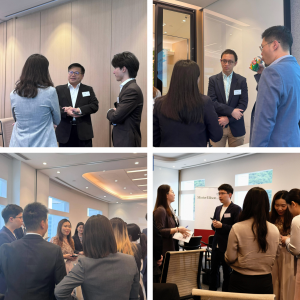George Tong and Ada Luk, our partners in our Corporate Team, have contributed to the Practice Note for Thomson Reuters’ Practical Law Global, outlining the typical transaction process when acquiring a Hong Kong business as a going concern by way of a purchase of assets (as opposed to shares), including putting in place preliminary agreements, carrying out due diligence, obtaining deal consents and regulatory approvals, preparing the requisite asset purchase agreement and other ancillary documents, and dealing with completion and post-completion steps. The note can be accessed here: Asset Purchases Overview (Hong Kong).
We have an outstanding team of lawyers, who will be able to advise on and help you navigate through such transactions. Should you have any enquiries or require assistance in this aspect, please do not hesitate to contact us.
* Reproduced from Practical Law with the permission of the publishers. For further information, please visit practicallaw.com.
We had the privilege of hosting a group of talented young lawyers from Mainland China. This visit provided an invaluable platform for exchanging insights on the evolving legal landscape, fostering mutual understanding, and exploring opportunities for collaboration between legal professionals across borders. Our visitors shared with us that they belong to a community group called “YoungLegal”, aiming to break down information barriers and promote mutual assistance, communication, and growth among young legal practitioners, and foster cooperation.
It was a pleasure for lawyers from our firm to share our experiences and engage in meaningful discussions on various aspects of legal practice with a dynamic group of young legal practitioners from Mainland China. The discussions not only provided insight into the differences between the legal practices in Hong Kong and the Mainland but also highlighted our shared commitment to professional growth and collaboration.
During the visit, our Partners Eddy So, Nicole Chan, Ada Luk, Associates Rachel Liu, and Kennis Cheung shared a range of topics, including:
The discussions were enriching, and we were impressed by the enthusiasm and curiosity of our visitors.
At our firm, we firmly believe that such interactions are instrumental in fostering professional development, enhancing mutual understanding, and building a strong, interconnected legal community across borders. The visit was co-ordinated by our Partner Eddy So and trainee Celine Chen.
Celine Chen, who coordinated the visit, expressed her strong support for the event, saying, “I’m truly proud to have been part of an event that helps build connections and promotes shared learning within the legal community.”
We look forward to more opportunities to engage with talented individuals and continue to contribute to the growth of the legal profession.




The Courts (Remote Hearing) Ordinance (Cap. 654) (the “Ordinance“) came into operation on 28 March 2025, introducing a clear legal framework for the conduct of remote hearings in Hong Kong’s judicial system.
Background and Purpose
As part of the Judiciary’s ongoing technological modernization efforts, remote hearings serve multiple practical purposes. They significantly reduce travel time for parties, legal representatives, and witnesses who would otherwise need to commute to court buildings. This efficiency not only benefits court users but also facilitates more streamlined scheduling of court proceedings. Furthermore, the remote hearing capability enables courts to continue functioning effectively during unforeseen circumstances where physical attendance becomes impractical or impossible.
According to the Hong Kong Judiciary Annual Report 2024, the Judiciary has already successfully conducted approximately 2,100 remote hearings for civil proceedings at different levels of courts and tribunals since 2020. The Ordinance establishes a clear legal basis for remote hearings at various levels of courts and tribunals.
Key Provisions
The Ordinance contains several important provisions that legal practitioners should familiarize themselves with:
New Criminal Offences
One of the most significant aspects of the Ordinance is the introduction of new criminal offences that legal practitioners should be particularly mindful of:
Implementation Timeline
Although the Ordinance is now in effect, implementation will follow a phased approach. The Judiciary has announced plans to begin remote hearings for non-trial criminal proceedings in approximately six months, providing stakeholders adequate time to prepare for the new procedures. In the meantime, the Judiciary will issue practice directions in phases that will specify operational details, application procedures, and technical guidelines for conducting remote hearings effectively.
Practical Implications
The introduction of remote hearings offers substantial efficiency benefits for legal practitioners. Most notably, solicitors and barristers may no longer need to physically attend court for brief procedural hearings (such as “three-minute hearings”), allowing them to participate from their offices instead. This change promises to significantly reduce unproductive travel and waiting time, enabling more efficient allocation of professional resources.
To support this transition, the Judiciary has developed technical support systems and will assign dedicated staff to facilitate remote hearings. This includes conducting pre-hearing connection tests to ensure smooth technical operation during actual proceedings.
Legal practitioners should remain attentive to forthcoming practice directions from the Judiciary, which will provide essential details on implementation procedures, technical requirements, and best practices for participating in remote hearings.
Access the full Ordinance here for more details.
This Friday, our Community Investment Committee attended the 2025 Chinese New Year Card Design Competition Awards at Fresh Fish Traders’ School. We are honoured to feature the winning design as our official Chinese New Year greeting card to clients.
Heartfelt congratulations to the winners and it is our honour to support the efforts of FFTS and to continue a cherished 15-year tradition with sponsoring this inspiring competition. Witnessing the recent developments and learning about the school’s vision and mission was truly inspiring and a reminder of the value of our ongoing involvement with the community.

In Tenwow International Holdings Limited (In Liquidation) and Anor v PricewaterhouseCoopers (a Firm) and PricewaterhouseCoopers Zhong Tian LLP [2024] HKCA 1193, the Court of Appeal (“CA“) ordered a letter of request to be issued by the High Court of Hong Kong to the Shanghai High People’s Court. This request seeks the transfer of audit working papers from the Mainland to Hong Kong pursuant to the Arrangement on Mutual Taking of Evidence in Civil and Commercial Matters between the Courts of the Mainland and the Hong Kong Special Administrative Region (《關於內地與香港特別行政區法院就民商事案件相互委託提取證據的安排》) (“Mutual Arrangement“).
The case involves an audit negligence claim filed by the liquidators of the Tenwow group and one of its subsidiaries against PwC and PwC Zhong Tian (an accounting firm incorporated in the Mainland). The liquidators alleged that PwC Zhong Tian had breached its duties by failing to detect defalcations by way of prepayments made to three supplies and illegitimate financial assistance given to a non-group company related to a director and his associates.
In respect of the audit working papers, the liquidators requested PwC Zhong Tian to provide, inter alia, its working papers; however, PwC Zhong Tian contested that Mainland laws and regulations imposed a blanket prohibition on the unauthorised transfer of audit working papers outside of the Mainland.
Mutual Arrangement
Pursuant to Article 6 of the Mutual Arrangement, the scope of assistance that may be requested by a Hong Kong court in seeking the taking of evidence by a Mainland court under the Mutual Arrangement includes:
(a) obtaining of statements from parties concerned and testimonies from witnesses;
(b) provision of documentary evidence, real evidence, audio-visual information and electronic data; and
(c) conduct of site examination and authentication.
The Court’s Ruling
Pursuant to the Mutual Arrangement, PwC Zhong Tian applied to the Court of First Instance for a letter of request to be issued by the High Court of Hong Kong to the Shanghai High People’s Court. However, such application was rejected by Anthony Chan J on the basis that letters of request were normally issued for obtaining evidence from non-parties, or at most for taking the evidence of a party overseas, rather than for the production of documents and discovery. Further, Anthony Chan J held that obtaining approval from the Mainland authorities did not fall within the categories referred to in Article 6, rendering the Mutual Arrangement inapplicable.
In the appeal, the CA allowed the appeal and ordered a letter of request to be issued for the following reasons, among others:
(a) In a broad sense a letter of request is a formal written document through which a court seeks assistance from a court in another jurisdiction, either under a convention or out of comity and reciprocity. While typically used to obtain evidence from third parties, it does not preclude their issuance to aid a party in fulfilling its own discovery obligations. Therefore, it is not inappropriate in principle to use a court-to-court request procedure in aid of the production of a party’s own documents in light of a legal impediment in the foreign jurisdiction;
(b) A letter of request is only a request. Issuing a letter of request does not necessarily subordinate the court’s power to the penal laws of another jurisdiction. It is a matter of discretion based on the case’s specifics, with no requirement to disregard or prioritise foreign law. The court retains full control over its processes even after a request is issued;
(c) After reviewing the relevant Mainland law and regulations, the CA was cautious about making any firm findings of Mainland law due to absence of oral examination of the experts and a lack of expert evidence regarding the latest Mainland regulation. Nevertheless, the CA concluded that PwC Zhong Tian had demonstrated a real risk that it would be penalised in the Mainland if it simply handed over copies of the audit working papers to the liquidators in Hong Kong without prior approval from the Mainland authorities;
(d) The use of court-to-court procedure is justified, as any requisite approval for the transmission of audit working papers for judicial proceedings should be sought pursuant to the applicable mutual judicial assistance protocol;
(e) The Mutual Arrangement is intended to facilitate the efficient and certain acquisition of evidence for civil and commercial matters by litigants in both jurisdictions. Therefore, there is no reason to interpret the Mutual Arrangement so restrictively as to exclude the present application for approval from the Mainland authorities. The assistance sought through the letter of request falls within the scope of the Mutual Arrangement, and aligns with the policy of Mainland law; and
(f) Concerning the objection based on the submission of futility, the CA determined that, in the absence of any evidence detailing what transpired with the letters of request in previous cases or the reasons for their non-execution, the Court would not infer that a letter of request in the present case would be futile.
Takeaways
Audit working papers are essential documents for the fair disposal of a claim alleging auditors’ negligence. This case marks the first successful application for a letter of request to transfer the audit working papers in a contentious context, serving as a precedent for future cases involving the transfer of such documents from the Mainland to Hong Kong, particularly in audit negligence claims. The CA’s rulings indicate a more flexible interpretation of the Mutual Arrangement, which may foster enhanced cooperation in taking of evidence in civil and commercial matters between Hong Kong and the Mainland in future cases.
The full judgment can be accessed here.
See news from our global offices